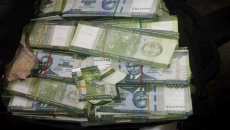BUCHANAN, Grand Bassa – Residents of Grand Bassa are appealing to the government to swiftly intervene as the accelerating depreciation of the Liberian dollar against the U.S. dollar is increasing economic hardships for rural dwellers, who mostly deal in the local currency.
The residents say the rapid increase in the U.S. exchange rate is slowing the pace of business activities in rural areas, as some marketers are avoiding coming to the market.
The vice president for operations of the Grand Bassa branch of the Liberia Marketing Association, Victoria G. Sherman, told The Bush Chicken that the government needs to swiftly intervene.
“The rate is too [high]; it is likely to increase to 200 [Liberian dollars to 1 U.S. dollar] because we are [at] more than 150 now. It is affecting us [in a] bad way. The place is dry because there is no money, so people are leaving the market,†she added.
Sherman said marketers are usually required to purchase a daily ticket to allow them to sell in the market, however, she said they have recently been refusing to purchase the tickets because they have seen their profits decrease significantly.
She said the 25kg bag of rice which was sold for L$1,800 previously is now L$2,350 (US$14.87) as the result of the hike in the U.S. rate.
Sherman said, in the past, some marketers used to sell 5 to 6 bags of the 25kg rice, but now, they are struggling to sell even one.
“The women are the homes; our families [are] depending on us. Some of our men are educated and cannot work because of no job, so the weight is on us and even our men are not also satisfied at all, so there is a problem. We now put them [the Coalition for Democratic Change government] in power, so let them look back, at least, let business return to normality,†she said.
A resident of Buchanan, Emmanuel Wragbo, said the rapidly increasing U.S. rate needs to be solved soon. He said the government needs to study the cause of the problem carefully to determine how to stabilize the economy.
“The country is suffering from this because most of our goods are purchased from abroad and Liberia is not exporting much that will bring in the United States dollars, and in the market when the U.S. is scarce, you have to encourage the people to bring it on the market. So, it should not be politicized because [it’s] an issue that the government needs to work on carefully,†he said.
Wragbo added that the government needs to bring in more companies to make investments and produce goods for export. He also suggested that Liberia start using a single currency to ease the situation.
The president of the Bassa Youth Caucus, Othello Contour, weighed into the issue, noting that the rise in the U.S. exchange rate started under the administration of former president Ellen Johnson Sirleaf, but he expressed hope that the current government would solve the issue.
“I just bought a dollar scratch card for L$160 (US$1.01); [the price of a] cup of rice has increased; razor blade is L$10 (US$0.06) for one; [for] mosquito coil, though there was tariff reduction, but yet still it has reached to L$10 (US$0.06) for one. Prices are very high. How do we expect the ordinary citizen to live? How does the Pro-Poor [Agenda] affect these people?†he said.
Contour noted that the absence of the gun is not the presence of total peace because Liberians are at war economically due to the hike in prices and increase of the U.S. exchange rate.
“The time of the government is still young, but again, the survivability of the people – what do they eat – is an issue. We can get everything – you can have the ability to build the skyscrapers – but if we don’t have the ability to eat, then it is troublesome,†he added.
He noted that for Liberia to cross this pivotal stage, it needs the holistic efforts of everyone, including the private sector, citizens, and opposition political parties, not the government alone. Such efforts, he said, is needed to avoid deeper economic instability.
Like many others, he recognized that the increase of the U.S. exchange rate is related to the drop in the prices of Liberia’s leading exports, including rubber and iron ore. He noted that Liberia was depending on the rest of the world for almost everything.
Contour recommended that the government should robustly focus on the agriculture sector by increasing budgetary support and subsidize institutions such as Liberian companies to grow more food and also export some locally made products.
When contacted about the cause of the increasing U.S. exchange rate, the Central Bank of Liberia’s public affairs director, Cyrus Badio, referred The Bush Chicken to the Central Bank’s 2017 annual report, which he said still contains valid answers to these questions.
The report noted that the depreciation between the Liberian dollar and the U.S. dollar is largely a result of deteriorating terms of trade and high demand for foreign exchange to facilitate imports.
The total demand for foreign exchange through the foreign exchange auction in 2017 was US$116.3 million. Of the total amount demanded, only US$53.3 million (45.7 percent) was provided by the Central Bank. In relation, the Central Bank only had to sell US$24.5 million in 2016.
According to the report, this resulted in an excess demand of US$63.1 million, which had to be acquired from other sources, which has translated into upward pressure on the exchange rate.
The Bank also projected the inflation outlook at the end of 2018 to be in the double digits, around 11.4 percent, adding that the prospect of having a single digit or lower double-digit rate of inflation will depend on increased domestic food production, improved access to markets, the behavior of international oil and food prices, and infrastructural developments, such as roads and energy supply. Given the rapidly accelerating exchange rate, the Central Bank’s projection for inflation by the end of 2018 now appears to be too conservative.
On April 6 this year, the Central Bank and the National Association of Foreign Exchange Bureaus of Liberia met to address challenges in the foreign exchange market. These challenges included the arbitrary hiking of the exchange rate by illegal foreign exchange operators and businesses engaged in foreign exchange activities, the act of arbitrage and profiteering by some businesses, and the proliferation of illegal foreign exchange operators in the streets, which undermines the operations of legitimate and licensed foreign exchange operators.
The two institutions agreed to further strengthen their collaboration to bring sanity in the foreign exchange market and minimize speculation in the market.
In that meeting, the Central Bank also agreed to begin working on modalities that will lead to the legitimate foreign exchange bureaus benefiting from the Bank’s foreign exchange auctions as a means of strengthening the association.
Featured photo by Sampson David



